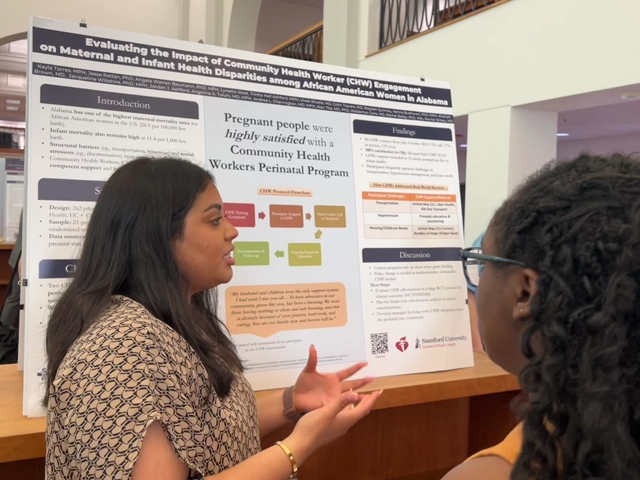
Students from Samford University’s School of Public Health were well represented at the fourth annual Student Research Colloquia, held Friday, April 25, in Davis Library. More than 160 poster presentations were shared in categories ranging from business to pharmacy to social work. Hosted in partnership by the Research Advisory Collaborative and the Office of Research, the event served as a public forum for undergraduate and graduate students to present original research across two poster sessions.
Two students took home top honors representing the school: Kayla Torres and Addie Hunter.
Kayla Torres, a Doctor of Public Health candidate, received top honors in the graduate category for her research Evaluating the Impact of Community Health Worker (CHW) Engagement on Maternal and Infant Health Disparities among African American Women in Alabama. Her study focuses on how CHWs can improve outcomes for African American mothers and infants in high-need communities.
According to a recent study by the Centers for Disease Control and Prevention, maternal mortality rates for African American women in Alabama are nearly double the national average, and infant mortality rates remain high. Torres analyzed medical records from 21 participants who received CHW support, finding that CHW interventions improved access to prenatal care, addressed barriers like transportation and insurance, and boosted health literacy. Her findings suggest that CHW programs offer a sustainable solution for reducing health disparities in underserved areas.
"My project was inspired by my passion for advancing maternal and infant health, particularly through community-based approaches," Torres said. "As a former Community Health Worker, I witnessed firsthand the challenges faced by underserved populations, which motivated me to focus my research on evaluating how CHW engagement can reduce disparities and improve outcomes."
She also credited her mentor, Rachel Bailey, for providing invaluable guidance throughout the research process. "The colloquia provides a great opportunity for students to not only share their work but learn about the process of communicating research findings," said Bailey, an associate professor in the Department of Public Health. "She said students receive feedback through informal conversations with members of the Samford community, gaining more insight and engagement in a more enjoyable way than through a written paper.
Another project came from Addie Hunter, an environmental science major, who presented research titled What are the neurological effects of mercury exposure from fish consumption during pregnancy on fetal brain development? Also mentored by Bailey, Hunter conducted a systematic review of peer-reviewed studies to evaluate how maternal mercury exposure impacts children's neurodevelopmental outcomes. Her work earned top recognition in the undergraduate category.
In addition to Torres and Hunter, other School of Public Health participants included Nyah Anderson, Gabe Groark, Giann Hoosier, Ella Ingram, Caley Ingram, Kaleigh Slagle and Macey Thompson.
The Research Advisory Collaborative leads the event in partnership with the Office of Research. Open to undergraduate and graduate students from all 10 academic schools, the colloquia provide students an opportunity to practice presenting their research across disciplines to a broader audience.
